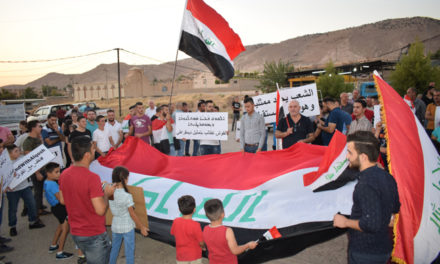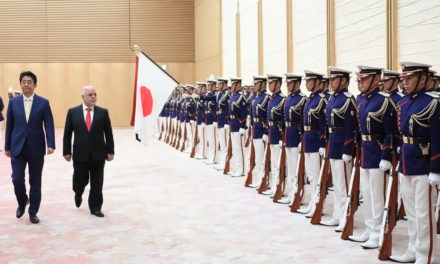On July 1st, the prime minister issued a decree regarding the controversial Popular Mobilization Forces (PMF). In order to understand the decree better it is important to reflect on the content, realities, and timing. These were the major points mentioned in it:
- The PMF is an indivisible part of the Iraqi Security Forces (ISF) and hence, subject to the same regulations.
- These forces work under the command of the Commander-in-Chief (CiC).
- The Chairman of the PMF is appointed by the CiC and all PMF formations are linked under him.
- All the names of different PMF groups must be given up permanently and replaced by military nomenclatures.
- Members of the PMF will be given military ranks comparable to those in the ISF.
- PMF personnel and formations shall sever any political or command affiliation with the previous organizations.
- Groups that do not wish to join the ISF can transition into political organizations subject to the Parties Law.
- Carrying arms is prohibited, except with a permit.
- PMF camps shall be designated in the same manner as the ISF.
- The existence of any armed group working overtly or covertly outside these instructions is prohibited and will be considered outlaws and will be prosecuted accordingly.
- All the economic offices, checkpoints, presence, or interests established outside the new work framework and formations of the PMF shall be closed.
- July 31st shall be the final date to lay down the final arrangements to finish the work in accordance with these regulations.
The possibility that the PMF might be involved in a potential conflict between Iran and the U.S. made the Iraqi government step in, albeit quite late,in order to finally have a say in a matter that could put the stability of the country at risk. Apart from the issue of timing however, many acted surprised by the Prime Minister’s order to institutionalize the PMF when all indicators showed that this was inevitable.
For starters, dissolving the PMF and leaving thousands without a job has never been a realistic option. No prime minister could get away with it as a large portion of the public sees them as heroes who put their lives on the line to save the country. Dissolving them would be regarded as betrayal and ungratefulness, especially when the danger of Da’ish is still present, as the PMF continue taking part in the fights against it.
However, even merging the PMF in the Iraqi Army, proposed by some as viable solution, would have caused massive problems. Organizationally speaking, merging a large military organization with a distinct origin and culture into the ISF would cause a lot of instability. The PMF at the moment has wide-ranging issues, amongst the most important ones is ‘lack of discipline’ while the ISF itself went through lots of transformations in the last few years. Hence, ISF needs time, effort, and focus for the reforms introduced to take hold. Taking in 60,000 PMF fighters, at least in a short time span, would be overwhelming and might undo a lot of the progress the ISF has achieved, while taking in individual fighters as it has been suggested is not a fundamental solution for the PMF conundrum.
Politically speaking, it would also be unlikely that the prime minister would in fact dissolve or merge the PMF when the government was formed based on an agreement between the ‘Al-Islah’ and ‘Al-Binaa’ alliances, with the latter consisting mostly of the political wings of the PMF. This is especially true when major factions in ‘Al-Islah’ are showing disscontempt with the prime minister’s performance in governing and are gradually moving into the opposition, which would leave the prime minister with less support from both sides.
At any rate, a law has been passed by the parliament that legitimizes and regulates the PMF. While in the beginning not applied in detail, the application of the law on the ground must eventually take place, and it would be a challenge for the prime minister to get away with not facilitating this. Therefore it would be rather surprising if the prime minister would have issued a decree different from what he issued a few days ago.
While the prime minister seems not to have a stable political backing, he is trying to use, as any seasoned politician would do, the different internal and external pressures in Iraqi politics in favour of his own agenda. The current state of the PMF is not sustainable, especially when important factions of it threaten to get involved in a regional conflict between the U.S. and Iran, dragging Iraq down a path with unpredictable outcomes.
Therefore, the logic of institutionalizing the PMF, or at least announcing to do so, is an attempt to satisfy part of the PMF factions demands for better pay and equal footing with the rest of the ISF, a reaffirmation that they are part of the state, and therefore any attack against them is also an attack against the Iraqi state. At the same time, integrating them further in the state by denying them the autonomy they are used to and prohibiting external economic activity will make it more difficult for the rogue parts of the PMF to act on behalf of it without facing consequences.
Announcing these measures is something and applying them on the ground is another. In practice, things are going to be more challenging and it would be unrealistic to look for perfect solutions. Hence, it might make more sense to look at the decree as a ‘statement’ that reaffirms the official position of the state regarding the PMF and outlines certain details, rather than a ‘decision’ when there was hardly one to make. Nevertheless, the decree makes the line that divides what is part of the state and what is not darker, and this by itself will have some consequences on the ground.











